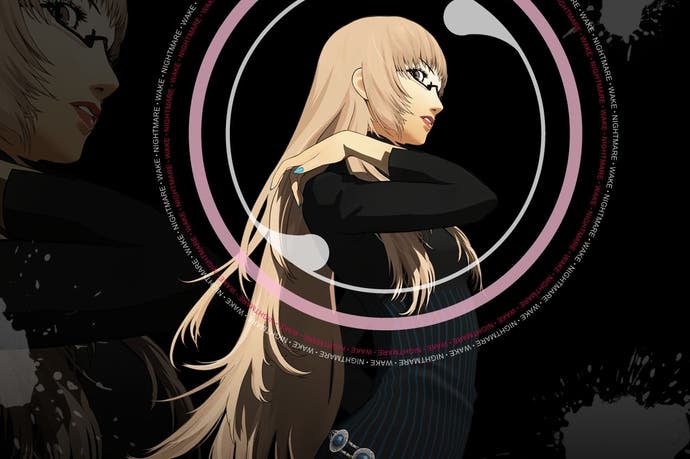Catherine retrospective
Sweet dreams are made of this.
Games often serve as a wonderful source of escapism, affording the opportunity to glide across the surface of a distant planet, pick through the threads of another age or don the mantle of a different species entirely. Occasionally, though, they let you hang out in a bar with a regular group of guys getting tanked. Guys who talk about things that you talk about over drinks that you drink; who experience the same existential angst as you do, and dread the same potentially fatal nightmares filled with anthropomorphised sheep and a behemoth mewing baby that's trying to squash you dead. OK, maybe not so much that last bit - but the point is that there are some games to which you can relate very strongly indeed.
Catherine is one of those games for me. When Atlus released its puzzler-cum-mirror-to-my-soul a couple of years ago there was something about both it and the bar that it depicts - the aptly named Stray Sheep - that reached into me and plucked a very personal chord. I recognised the unwillingness of Vincent Brooks and his friends to wholly embrace adulthood and get on with the serious business of being a grown-up just as keenly as I longed to nab a slice of their pepperoni pizza; I marvel still at how hearing the tinkle of ice cubes in Vincent's Cuba Libre makes me crave a rum and cola of my own.
For me, this is the crux of Catherine; that it has power to speak to people on any number of levels. Ostensibly, it is the story of loveable loser Vincent Brooks (voiced by the ubiquitous Troy Baker) and his inability to commit to his girlfriend, Katherine, while at the same time becoming haplessly embroiled in misadventure with blonde succubus, Catherine. More than that, though, it encapsulates one of those moments in life that we all experience: where we choose, either through determined action or apathetic indecision, what direction we're going to head in.
As such, in the process of guiding Vincent through a series of nine nights over which his life goes from being simple but stationary to hurtling into oblivion, I came to will him to succeed. I wanted him to shake himself free of the fuzzy state of suspended reality in which he'd cocooned himself and realise that standing still was no longer an option.
Sure, Vincent and I occasionally got drunk together, and through that drunken haze I might have been responsible for some of the questionable text messages that he sent to the women in his life, but mostly I had his best interests at heart. I wanted him to make a decision, any decision, and in doing so prove that we 30-somethings are capable of taking responsibility for moving our lives forward.
Of course, Catherine is about more than just self-indulgent navel-gazing at a bar, for when Vincent finally leaves at the end of every night - be it with an earnest stride of sobriety or the familiar staggered gait of the pleasantly inebriated - he is destined to stumble into one of the aptly titled nightmare stages. Difficult as they may be, it's here that Catherine's fiendishly challenging puzzles conspire to make a decisive man of Vincent even as they emasculate him with a pair of pink-spotted boxer shorts and a pillow under his arm.
Here, Vincent moves, quite literally, onwards and upwards as he clambers over physical blocks in his dream-world despite being so utterly incapable of surmounting the emotional blocks of his waking hours. Time and again Vincent must push and pull these blocks to create convoluted paths to climb ever upwards in a bid to escape a crumbling tower in some hellish setting, all to the discordant sound of Bach's Little Fugue or the fraught tones of Chopin's Revolutionary Etude. It's exhausting, quite frankly, and when you do reach the top you're often met by yet more disturbing scenes, like a herd of rams who bare uncanny resemblances to the patrons of the Stray Sheep, each of whom has both a deep-seated problem and the untapped potential to solve it, if only they'd stop feeling sorry for themselves and grab life by the horns, as it were.
Catherine is laden with such imagery; some subtle, some a great deal more provocative. Certainly, the boss stages pull no punches and have Vincent scaling that damnable tower under the duress of pursuit by a titanic inner-demon conjured-up by his subconscious. From the fear of commitment to the panic of impending fatherhood via the guilt of an "immoral" sexual act, there's little doubt as to the causes of Vincent's emotional turmoil.
Yet more revealing are the questions that you are asked between each level, designed to gauge your attitudes to love and life. These serve to influence Vincent's internal monologues and, along with other flashpoints, determine which of the eight endings you'll see ('True Freedom', for me). Yet when all is said and done, Catherine is not about whether or not Vincent cheats on his girlfriend or uncovers the mystery behind men dying in their sleep. Those things are going to happen regardless of your choices. Instead, Catherine is about how its themes and events make you feel and the parallels you can draw with your own attitudes and life choices.
It's interesting to note that game director, Hashino Katsura, originally envisaged the premise of Catherine's communal nightmare taking place on a battlefront, where traumatised soldiers shared a restless sleep between skirmishes. Happily, Katsura figured that very few people have any inkling of what it's like to fight in a war and so he settled on the more familiar and relatable surrounds of a bar, instead.
I'm glad that he did. I've been back several times and hung out with Vincent and the gang in the Stray Sheep. I put some tunes on the jukebox, try to beat my high score on the bar's arcade cabinet and maybe have a beer or two. It reminds me of a time when both Vincent and I were facing up to different aspects of our lives, and it's reassuring to consider how we both overcame the challenges they presented. And I find that it helps to go there when I'm having trouble sleeping.








